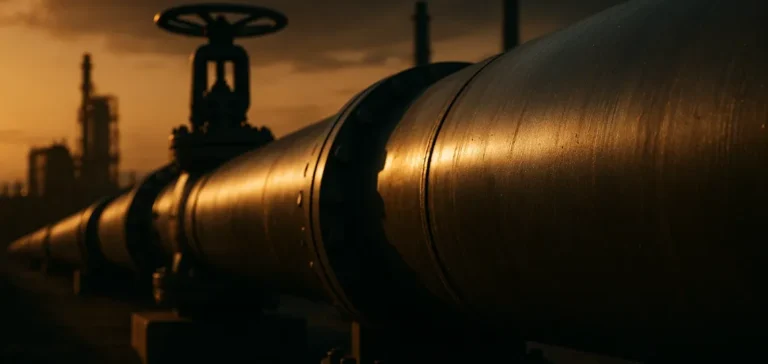The Iraqi and Syrian energy ministers formalized on August 11 the creation of joint technical committees to assess the rehabilitation of the Kirkuk-Baniyas pipeline, a strategic infrastructure linking northern Iraq’s oil fields to the Syrian Mediterranean port. This initiative comes as Iraq actively seeks to diversify its export routes, particularly after the closure of the Iraq-Turkey pipeline since March 2023 following an international arbitration that ordered Ankara to pay $1.5 billion in compensation to Baghdad. The Iraqi Prime Minister’s financial advisor, Mudhir Mohammad Saleh, describes this project as a “strategic choice” allowing greater maneuverability in marketing Iraqi crude. Current negotiations mark the third round of discussions since December 2024, demonstrating diplomatic acceleration between the two countries after the fall of the Assad regime.
Considerable Financial and Technical Challenges
Cost estimates for pipeline reactivation vary significantly depending on sources and the scope of work envisioned. Iraqi oil expert Hamza al-Jawahiri estimates $10 billion for an entirely new pipeline, deeming the current 73-year-old infrastructure unsuitable for crude transport. A North Oil Company official proposes a more modest range between $300 and $600 million for partial rehabilitation, with potential financing through the federal budget or foreign partnerships. The Iraqi oil ministry meanwhile mentions an investment exceeding $8 billion for an export capacity of 700,000 barrels per day. These discrepancies reflect uncertainty about the actual state of infrastructure, with Syrian Deputy Energy Minister Ghiyath Diab confirming that pumping stations are “largely destroyed” and require complete rehabilitation.
Current Kirkuk production capacities add an additional dimension to economic calculations. North Oil Company currently produces between 245,000 and 300,000 barrels per day, with ambitious expansion plans targeting 750,000 daily barrels thanks to the recently signed partnership with BP. The agreement, finalized in March 2025, covers the development of four major fields including the Baba and Avanah domes of Kirkuk as well as the adjacent fields of Bai Hassan, Jambur, and Khabbaz. BP will potentially invest $25 billion over 25 years in this project covering more than 3 billion barrels of oil equivalent in the initial phase, with a total resource opportunity estimated at 20 billion barrels.
A Regional Context Under Tension
The prolonged closure of the Iraq-Turkey pipeline crystallizes regional geopolitical stakes. The International Chamber of Commerce (ICC) arbitration not only imposed financial compensation on Turkey but also deprived the Kurdistan Regional Government (KRG) of its main export route. Kurdish production fell to 314,000 barrels per day in 2024, compared to a capacity of over 450,000 barrels before March 2023. The Khurmala field, Kurdistan’s largest, now produces only 100,000 daily barrels compared to 180,000 previously. This situation generates monthly losses approaching one billion dollars for the KRG and international companies operating in the region.
Turkey, which generates between $300 and $500 million annually through transit fees at Ceyhan, announced the end of the current pipeline agreement for July 2026, opening a complex negotiation window. Ankara refuses to pay the compensation ordered by arbitration and asks the KRG to assume this charge, arguing it was the beneficiary of contested exports. A second arbitration concerning the 2018-2023 period could add an additional $3 to $5 billion to compensations due, further complicating resolution prospects.
Syria Facing Its Own Energy Challenges
Syrian oil infrastructure presents major obstacles to pipeline reactivation. The Baniyas (120,000 barrels/day) and Homs (110,000 barrels/day) refineries remain non-operational according to latest reports. Syrian national production collapsed from 380,000 daily barrels before 2011 to only 91,000 barrels in 2023. The country currently imports about 3 million barrels monthly to cover domestic needs, representing a daily cost of $14 to $15 million at current market prices. Syrian authorities see pipeline reactivation as an opportunity to generate transit revenues essential for reconstruction while securing stable energy supply.
The partial lifting of American sanctions in July 2025, removing restrictions on the Syrian oil ministry and its two refineries, constitutes a crucial step for project feasibility. This six-month decision theoretically allows international companies to consider investments in the Syrian energy sector. Nevertheless, security challenges persist, notably the control of eastern Syrian oil fields by U.S.-backed Syrian Democratic Forces, complicating oil transport to western refining facilities.
Strategic Implications for the Entire Middle East
The potential reactivation of the Kirkuk-Baniyas pipeline would redraw the regional energy map by offering Iraq direct access to Mediterranean and European markets. This alternative route would reduce Baghdad’s dependence on the Strait of Hormuz, through which 85% of current Iraqi oil exports transit. Recent tensions between Iran and Israel highlighted the vulnerability of this strategic passage point, where even temporary closure would compromise more than 90% of Iraqi federal budget revenues. The Syrian pipeline would also provide an alternative to the Basra-Aqaba pipeline project to Jordan and discussions about a route via Saudi Arabia to the Red Sea.
For Turkey, the project represents a direct threat to its position as a regional energy hub and could accelerate negotiations on reopening the Kirkuk-Ceyhan pipeline. Analysts estimate that the loss of Kurdish and Iraqi oil transit could cost Ankara not only direct revenues but also its geopolitical influence in northern Iraq. Syrian pipeline reactivation would allow Baghdad to regain full control of northern oil revenues, weakening Kurdistan’s economic autonomy and strengthening central authority. This dynamic fits into Iraq’s broader strategy to increase production capacity to 6 million barrels per day by 2028, imperatively requiring new export routes to channel this increased production to international markets.






















